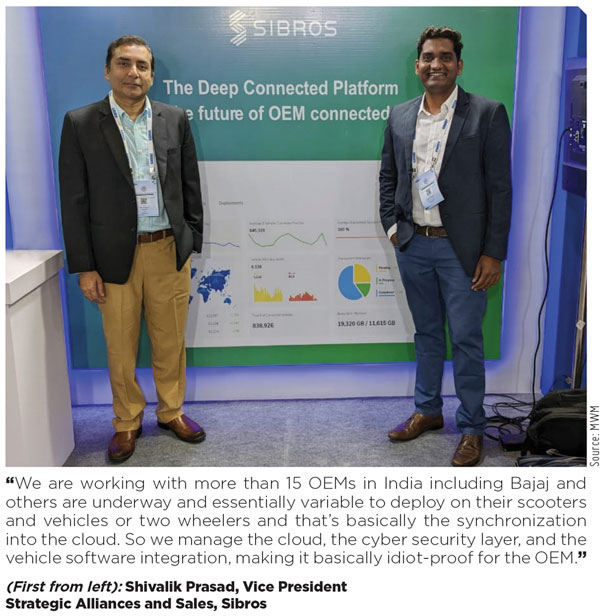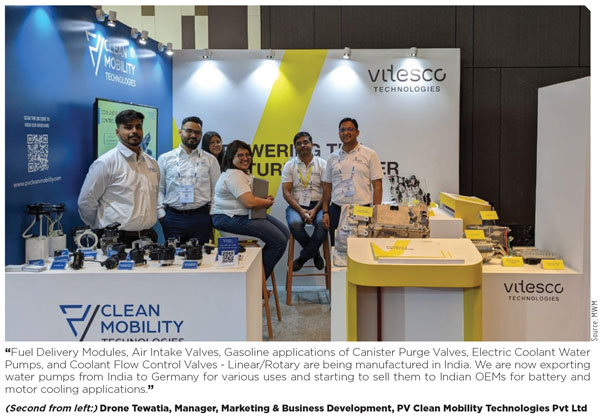Innovating Future Mobility

With the aim to disseminate knowledge in the Mobility industry, SAEINDIA, in collaboration with SAE International, held its 10th SAEINDIA International Mobility Conference (SIIMC2022) as a phygital event on October 12-14, 2022, at the Hilton Bengaluru Embassy Manyata Business Park in Bengaluru, Karnataka.With the aim to disseminate knowledge in the Mobility industry, SAEINDIA, in collaboration with SAE International, held its 10th SAEINDIA International Mobility Conference (SIIMC2022) as a phygital event on October 12-14, 2022, at the Hilton Bengaluru Embassy Manyata Business Park in Bengaluru, Karnataka.
The three-day event, themed ‘Sustainable Multi-Modal Mobility Ecosystem’, continues SAEINDIA’s commitment to advancing and promoting mobility engineering.
Key highlights
More than 180 papers and 543 abstracts on engineering innovations were presented during the conference with the goal of encouraging sustainable and multi-modal mobility in India and around the world. TechHive, a specialized venue for technological presentations and product demos/B2B stalls, was the primary gathering area for mobility entrepreneurs and investors to chat and build business ties.
The inaugural session’s Chief Guest was Dr Murugesh Nirani, Minister of Large and Medium Industries, Govt of Karnataka. Hon’ble Chief Minister Shri Basavaraj Bommai, Govt of Karnataka; Dr Ashwath Narayan, Minister of Skill Development, Entrepreneurship & Livelihood, Govt of Karnataka; and Randheer Singh, Director - Electric Mobility, NITI Aayog, also presented their views on mobility.
CV Raman, CTO, Maruti Suzuki; Vijay Nirani, Managing Director, MRN Group; Vinay Harne, CTO, TVS Motors; Brian McMurray, President, General Motors - Korea; Dr Sri Srinath, President, SAE International; and Prashant Doreswamy, President, Continental Automotive India, were among the distinguished industrialists who addressed the conference.
Other key dignitaries included Rashmi Urdhwareshe, President SAI, Co-Chair - Steering Committee and Former Director, ARAI; Mahesh Babu, Patron - SIIMC 2022 and CEO, Switch Mobility; Damodaran Subramanian, Member - Steering Committee, Former MD, Safran Engineering; and Munirathinam Dhananjayan, Chair - Organizing Committee Founder & MD, Focus Engineering.
EV adoption, the need of the hour India’s transportation sector accounts for 13 percent of total CO2 emissions, and the demand is predicted to increase by 2.7 times over the next 30 years, boosting emissions. “While transportation has been critical to India’s historical progress, it has been accompanied by various problems, the most significant of which is air pollution,” says NITI Aayog’s Director - Electric Mobility. “We need to decouple our economic growth from expansion in the motorized transportation sector.”Singh also noted that the average level of travel in India has climbed to 5,000 km per year, a threefold increase since 2000. “Vehicle ownership has also surged fivefold in the last two decades. On the freight side, it has resulted in a quadrupling in truck ownership between the years 2000 and 2019, or about 20 years. As a result, the move to EVs (Electric Vehicles) is unavoidable,” he emphasized.
India’s transportation sector accounts for 13 percent of total CO2 emissions, and the demand is predicted to increase by 2.7 times over the next 30 years, boosting emissions. “While transportation has been critical to India’s historical progress, it has been accompanied by various problems, the most significant of which is air pollution,” says NITI Aayog’s Director - Electric Mobility. “We need to decouple our economic growth from expansion in the motorized transportation sector.”Singh also noted that the average level of travel in India has climbed to 5,000 km per year, a threefold increase since 2000. “Vehicle ownership has also surged fivefold in the last two decades. On the freight side, it has resulted in a quadrupling in truck ownership between the years 2000 and 2019, or about 20 years. As a result, the move to EVs (Electric Vehicles) is unavoidable,” he emphasized.
The National Programme on Advanced Chemistry Cell (NPACC) and PLI scheme seek to encourage companies to establish a Giga-scale of a minimum 5 GWh battery storage manufacturing in India over a five-year period. Currently, lithium-ion batteries dominate, but Singh disclosed that the development of alternative chemistries such as sodium-ion, lithium-carbon, solid-state, and flow batteries would ultimately begin and would be funded by the program as well. He also asserted that the onus is on the industry, and the EV needs to conform to higher safety standards as it impacts consumer sentiment.
In terms of charging infrastructure, he sees four major breakthroughs:
- Captive Charging Stations, which will be directly driven by usage.
- Public Charging Stations, which will be the commercial EV charging stations.
- Battery Swapping Stations, where the battery is provided as a service, including everything behind the meter, mobility, stationary storage, and other storage-related things.
- E-Bus Depot Charging, where charging is done as a service, subscription models, along with bayside amenity services.
The conference featured over 180 presentations and 543 abstracts on engineering innovations aimed at boosting sustainable and multi-modal mobility in India and around the world.
Combining efforts
PV Clean Mobility Technologies Pvt Ltd, a joint venture formed by Padmini VNA Mechatronics and Vitesco Technologies, showcased its key products at the event, including Fuel Delivery Modules, Air Intake Valves, Gasoline applications of Canister Purge Valves, Electric Coolant Water Pumps, and Coolant Flow Control Valves - Linear/Rotary. “All of these solutions that we are offering to the Indian market are already ethanol compatible,” said Drone Tewatia, Manager, Marketing & Business Development, PV Clean Mobility Technologies. “The best part is that everything is already being manufactured in India. We are now exporting water pumps from India to Germany for various uses and starting to sell them to Indian OEMs for battery and motor cooling applications.”
Shivalik Prasad, Vice President, Strategic Alliances and Sales, Sibros, a participant at SIIMC2022 and speaker in the conference’s panel session ‘Going Autonomous & Connected - A Safe Road Ahead?’ said, “We provide a software abstraction layer on any kind of vehicle, where we are able to collect data across any electronic control unit (ECU) inside the vehicle across any electrical architecture of a vehicle on demand up to a 1-millisecond frequency, and we have the ability to fully update every issue from the cloud into the car.”
Stressing that EV adoption is a fundamental shift and a sustainable option, he revealed, “We are working with more than 15 OEMs in India including Bajaj and others are underway, and essentially variable to deploy on their scooters and vehicles or two wheelers and that’s basically the synchronization into the cloud. So we manage the cloud, the cyber security layer, and the vehicle software integration, making it basically idiot-proof for the OEM.”

The key organizations that participated in the conference include Maruti Suzuki, Tata Motors, Volvo, Tata Consultancy Services, Ashok Leyland, Infosys, Bosch, Hindustan Aeronautics Ltd, Indian Oil Corporation, and the Indian Institute of Science.
Insightful discussions
Panel discussions were led by industry experts and researchers, featuring speakers from the country’s leading automotive and technology organizations, as well as science and engineering institutes. The key organizations that participated in the conference include Maruti Suzuki, Tata Motors, Volvo, Tata Consultancy Services, Ashok Leyland, Infosys, Bosch, Hindustan Aeronautics Ltd, Indian Oil Corporation, and the Indian Institute of Science. Some of the key sessions had the speakers discuss themes, including the role of the Automotive industry in meeting the challenges of global warming, the Design and development of low-cost electric microcars for urban commuting, Edge computing for multi-modal and inter-modal mobility, Building (Globally) connected car platforms – Unearthing complexity, Balancing of energy efficiency, Driving excitement and comfort in battery electric vehicles, and Is battery swapping a viable alternative to accelerate the electric vehicle adoption in India.

MURALI SUNDARAM
Correspondent
Magic Wand Media Inc
murali.sundaram@magicwandmedia.in



 Facebook
Facebook.png) Twitter
Twitter Linkedin
Linkedin Subscribe
Subscribe